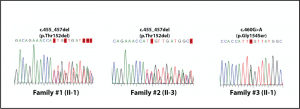CRS4 has been a pioneer in the development of enabling technologies for the interpretation of data generated by NGS sequencing instrumentation and their use to identify the genetic variants underlying certain diseases.
As an example of this activity, the image (taken from: A. Masotti, P. Uva, et al Keppen-Lubinsky Syndrome is Caused by Mutations in the Inwardly Rectifying Kþ Channel Encoded by KCNJ6. The American Journal of Human Genetics 96, 295-300 (2015)) shows the results of Sanger sequencing of mutated regions, which confirms the results of NGS sequencing.
The variants identified by the exome sequencing has not been previously notified or annotated in the different databases of publicly available exome sequencing variants or identified in the 1,400 healthy individual exomes used as control.




